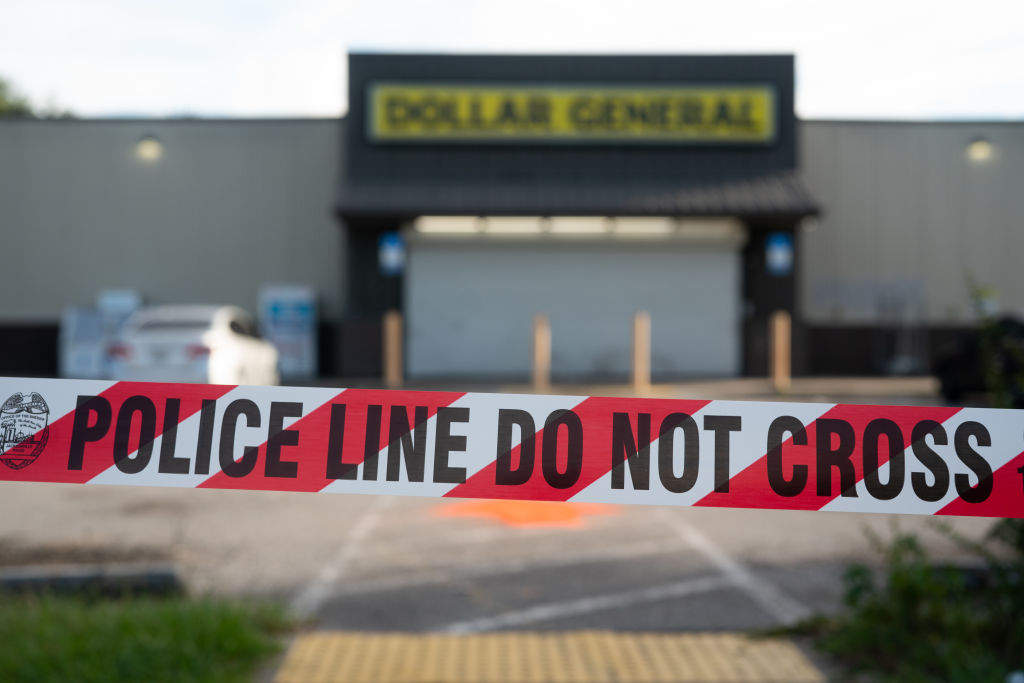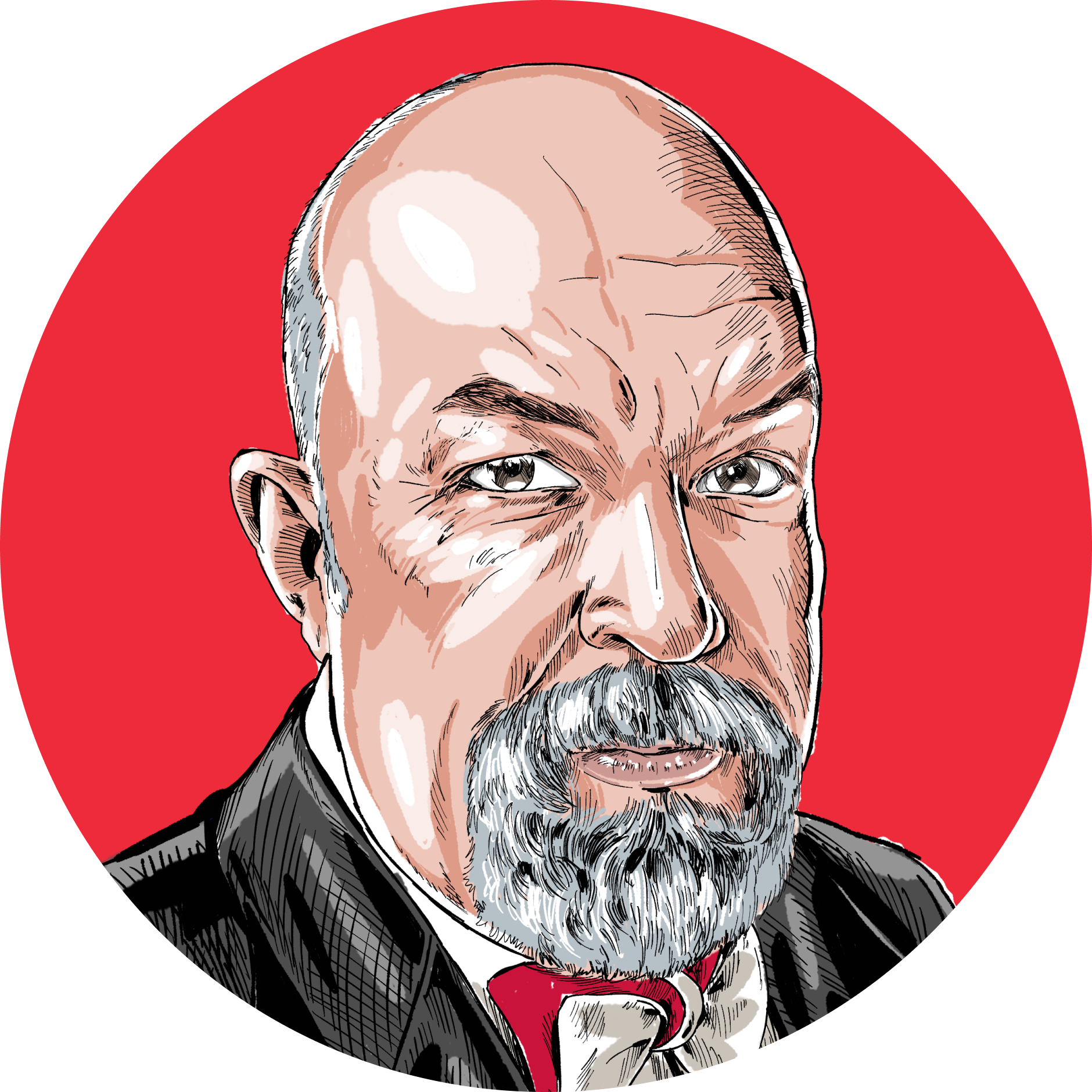The recent shooting at a Dollar General store in Jacksonville, Florida, has something in common with a great many other mass shootings of its kind: The shooter was known to police and mental health professionals, who did essentially nothing to prevent the atrocity that the killer ultimately carried out.
Doing nothing is, in fact, a pretty common course of action in these cases—right up until the point at which everybody says that nobody could have seen this coming when, in reality, a whole lot of people pretty plainly did see it coming. You could have watched the Jacksonville killer getting geared up on TikTok if you wanted to literally see it coming—there was a video taken by a bystander after he was turned away by security at nearby Edward Waters University, a historically black institution that was probably the killer’s intended target.
The Jacksonville shooter was a troubled young man from a troubled family. Police had been dispatched to his family home over at least one domestic-disturbance complaint involving the future killer (a minor at the time) and his older brother, who currently is serving a prison sentence for felony robbery. As an adult, the killer again came into contact with authorities when he threatened to kill himself and was involuntarily held for psychiatric evaluation under a Florida law known as the Baker Act.
Getting “Baker Acted,” as the local legal jargon puts it, is a serious matter in Florida. It begins with a 72-hour period of involuntary custody, after which the subject may be held for as long as six months for involuntary treatment after a court hearing. Baker Act proceedings can be initiated by a judge, by certain mental health professionals, or by law enforcement personnel. The law requires that the subject be mentally impaired in some significant way (and not merely from the results of drug or alcohol abuse), unable to understand why a mental health evaluation is necessary, and likely to cause harm to himself or others without intervention.
All of those criteria sound like an excellent reason to put someone on the list of people prohibited from buying firearms, but a temporary commitment under the Baker Act is not disqualifying under federal firearms laws. As ATF documentation puts it, the prohibition requires:
the formal commitment of a person to a mental institution by a court, board, commission, or other lawful authority. The term includes a commitment to a mental institution involuntarily. The term includes commitment for mental defectiveness or mental illness. It includes commitments for other reasons, such as for drug use. The term does not include a person in a mental institution for observation or a voluntary admission to a mental institution.
A Baker Act commitment can lead to a court-ordered commitment of the kind that disqualifies a person from legally purchasing a firearm, but that requires a process involving a judge, a court hearing, and a public defender or other legal counsel. That, in turn, requires somebody willing to put in the work to make it happen. In this case—and there are many other cases like this case—what happened after the 72-hour examination was: nothing. The examining physician or mental health professional could have petitioned for a hearing and additional treatment, and a court could have ordered that treatment. But, instead, the future killer was released. There was no report to the Florida Department of Law Enforcement, because there was nothing to report, and so the episode had no effect on the future killer’s background check when purchasing a firearm. Asked for comment, the ATF confirms that, given the specifics of the case, nothing about the Jacksonville killer would ever have reached their desks.
This—almost exactly this—has happened before, both around the country and right there in Florida.
The killer in the 2018 Parkland massacre had also been the subject of an attempted Baker Act process, but, in spite of the recommendations of the high-school counselors who suggested involuntary evaluation, mental health authorities determined that he was “at low risk of harming himself or others.” Not having been excluded on mental health grounds, the Parkland killer was able to legally purchase firearms in the runup to that infamous crime. That killer had been the subject of dozens of police calls, had threatened to shoot up the school, and had been described by one terrified party as “a school shooter in the making.” He was a walking red flag, and, long before Florida passed its current red flag law, law enforcement and mental health professionals already had adequate tools to intervene in his case—and, at the very least, to keep the future killer from buying firearms legally. But they did not use those tools in a proactive and effective way.
Beating up the responsible authorities for making the wrong call is easy—and, in some of these cases, there should be very uncomfortable questions asked about the apparent negligence involved in letting these future killers run around unsupervised. But the more important point to understand is that there isn’t a good process that can be relied upon in these situations. We could have the smartest people in the world making these decisions at the institutional level, but simply hoping they get it right—every time—is not much of a plan. We have a procedural lacuna between institutionalization and laissez-faire, and we should try to fill it.
Take, for example, the “red flag” laws that have been put forward as a promising bipartisan reform measure. Despite the hype, they really do not seem to actually accomplish very much. As the Associated Press reports, Chicago had 8,500 shootings from 2020 to late 2022—resulting in 1,800 deaths—and the Illinois red flag law was invoked in Chicago only four times during the course of all that bloodletting. In the overall picture of American violence, red flag laws are unlikely to prevent very many murders, because very few murders are the demonstrative kind carried out by maladjusted young men with manifestos. Most murders in the United States are criminal-on-criminal violence, with majorities of both shooting suspects and shooting victims having previously been convicted of a crime of one kind or another.
A Milwaukee study, for example, found that 97 percent of the suspects in one year’s non-fatal shootings had at least one prior arrest, along with 86 percent of the victims. In New York City, one survey found that about 80 percent of all murderers and a comparable share of murder victims had prior criminal histories. The majority of violent crime in the United States is the work of a relatively small number of dedicated career criminals: Prisoners currently in state custody have an average of 10 arrests and five criminal convictions.
Manifesto killers (not all of whom leave behind actual manifestos) are black swans—rare overall, but appearing regularly enough to constitute a phenomenon. And just because these killings are rare—relatively rare in our extraordinarily violent society—does not mean that we should shrug our shoulders and concentrate the entirety of our efforts on the more than 99 percent of murders that do not follow the manifesto-killer pattern. But given how poor a job we do with the ordinary killers—leaving them at large to commit murders even after a half-dozen or a dozen arrests and any number of criminal convictions—it is no surprise that we do such a poor job with the manifesto killers. Those in that latter group are very often are white and middle class, may have concerned parents interceding on their behalf when they get into trouble, and typically do not have any criminal convictions on their résumés—all of which tends to correlate with relatively gentle treatment from police and other authorities. The Jacksonville killer was clearly troubled, but he went to his grave with a clean criminal record.
We probably should be more assertive when it comes to involuntary psychiatric treatment. But there is a lot of open policy space between a court-ordered involuntary commitment and offering the obviously mentally disturbed a hearty, “So long! Good luck!” An involuntary commitment can be suspended, for example, on the condition that the subject voluntarily cooperates with treatment. Most states already have some version of “mental health probation,” in which troubled people may avoid being put involuntarily into the custody of an institution (hospital or prison) subject to ongoing treatment, check-ins, surveillance, or school or work requirements—not unlike the conditions that go along with probation or parole. But this is typically part of a sentence following a criminal conviction rather than a preventative measure. And, as with ordinary probation, the level of supervision and surveillance is often superficial and ineffective.
(Mental health is, of course, a big part of the picture when it comes to crimes other than those associated with manifesto killers, too; the people who complain that troubled middle-class white kids are treated as victims in need of sympathetic care while troubled poor black kids are “super predators” and “thugs” in need of severity are in many cases much more correct than many law-and-order advocates would care to admit.)
But even if we agree with the relevant authorities that the Jacksonville killer did not at the time of his involuntary examination obviously meet the requirements for further involuntary care, surely turning him loose and then doing—again—nothing, was plainly and inarguably the wrong decision.
One obvious problem is this: Implementing a broader program along the lines of an expanded version of mental health probation would be (new flash, Vivek Ramaswamy!) expensive, and it would require a great deal of work. Government can do work, when it wants to: If you have ever been delinquent on your taxes, for example, you know how energetic the feds can be. It is important work, but we have had very little success in getting government to do the work when it comes to violent crime involving firearms—gun-specific crimes short of murder are prosecuted sparingly, straw purchasers are almost never prosecuted outside of a broader organized-crime investigation, and the most likely outcome after arrest for a gun-related crime short of murder is—there’s that word again—nothing. In Philadelphia, for example, the majority of gun charges are dismissed or withdrawn—and that is policy at work: A few years ago, only 30 percent of those cases were withdrawn or dismissed, and today it is more than twice that figure.
If the most common outcome for someone being dragged in on a gun charge is for prosecutors to throw him back in the lake and keep fishing, then it is going to take a real change in institutional culture to get the relevant authorities to muster an adequate and appropriate response in cases where there often is no criminal charge at all.
On the other hand, if you think that we can deal with these complex problems by intensifying the federal regulatory oversight of $12-an-hour clerks at sporting goods stores—which is what 97 percent of gun-control proposals amount to—then you are almost as delusional as one of these Baker Act cases. We have a lot of tools in the toolbox, but we do not—choose not to—use them.









Please note that we at The Dispatch hold ourselves, our work, and our commenters to a higher standard than other places on the internet. We welcome comments that foster genuine debate or discussion—including comments critical of us or our work—but responses that include ad hominem attacks on fellow Dispatch members or are intended to stoke fear and anger may be moderated.